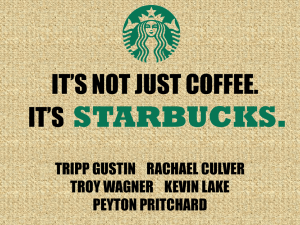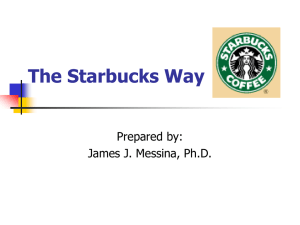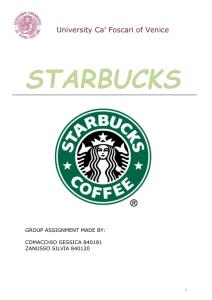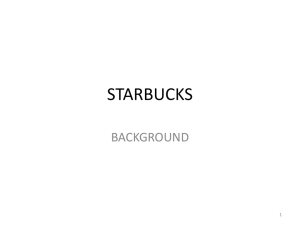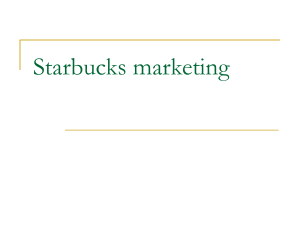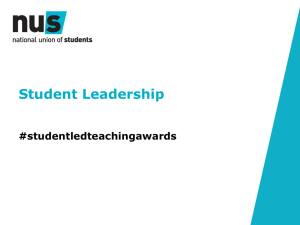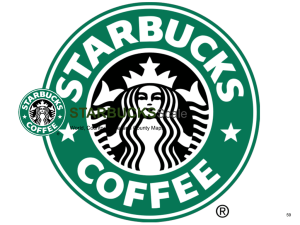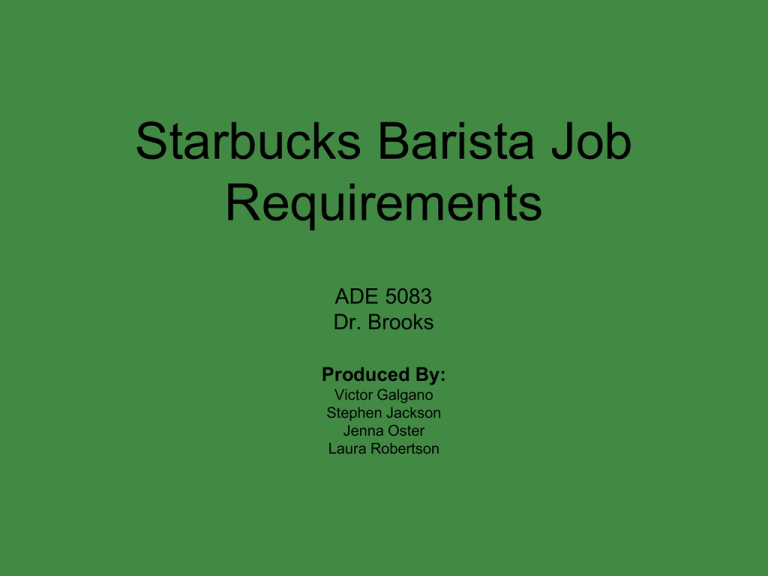
Starbucks Barista Job
Requirements
ADE 5083
Dr. Brooks
Produced By:
Victor Galgano
Stephen Jackson
Jenna Oster
Laura Robertson
Purpose of the Program
The purpose of this course is to provide the
new barista employees of Starbucks the
essential tools and skills that are necessary
to uphold the values set in place by the
Starbucks Company.
Course Overview
The course focuses on the elements of the
job that are related to customer service and
the expectations for the barista when
interacting with the clients.
Standards of Business Conduct
Under the Standards of Business Conduct in the Business Ethics
and Compliance handbook it states that legendary customer
service is a top priority at Starbucks. They treat their customers
with respect and dignity.
Legendary Customer Service
• Legendary service includes:
– prompt service
– quality beverages and products
– maintaining a clean and comfortable store
environment.
• This course outline explains the principles
as they relate to customer service.
Customer Service Principles
• A welcoming presence: Baristas are required to use the standard
greetings upon entry of all customers into Starbucks locations.
Greetings make first and lasting impressions that allow the customer
to enjoy their stay and entice them to return again. Friendly body
language is used in combination with the greetings to ensure a
positive experience.
• Prompt service: Baristas will produce the requested beverage to
the client in a timely and orderly fashion. Upon an order, the barista
ensures the customer wait time is limited and the beverage is served
with 100% accuracy.
• Maintaining a comfortable store environment: Baristas will show
professionalism and provide a warm, welcoming environment to the
Starbucks patrons. Baristas adhere to customer requests and fulfill
their needs.
Needs Assessment
• We will focus on the Task Analysis level of
assessing the needs of the client.
• The task analysis is geared towards a customer
service-oriented training module for the client’s
baristas.
• Information on the customer service expectations
of the baristas will be derived from unstructured
interviews and observations with baristas and
barista managers at the local Starbucks.
Strategic/Organizational Analysis
• Training will be focused on the customer
service job requirements of the baristas at
a Starbucks Café.
• Information will be gathered from the
company website about the overall
organizational mission and focus.
Task Analysis
• Learner Characteristics:
– The characteristics for the learners in this course
may range from all ages and potentially be any
sex.
– The learners’ characteristics will not necessary be
a factor in the design of the program due to the
broad range of potential trainees.
– Learners will require some high school education.
Task Analysis
• Job Description:
– The barista is to perform the designated customer
service principles of the company. These
principles include a welcoming presence, prompt
service, and maintaining a comfortable store
environment.
– This job description was developed from
observing and interviewing workers, baristas, and
a barista manager at the local Starbucks.
Information was also collected from their website.
Task Analysis
• Task Identification: (Rated by Importance)
1.
2.
3.
4.
5.
6.
Beverage identification
Beverage procedural knowledge
Quick and responsive to orders
Maintain a clean and orderly environment
Have a smile with correct upright body posture
Greet each customer as they enter the door
Task Analysis
• KSAO:
– Ability to multi-task
– Handle fast paced environment
– Handle pressure
– Customer service experience is preferred, but
not required
– Oral and written communication skills
– Work in a teaming environment
Performance and Learning Objectives
1. Given the Starbucks Barista Customer Service Manual, baristas will
greet all customers upon entry to the café using at least one of the
indicated greetings found in the manual.
2. Given all the recipes for drinks on the Starbucks menu, baristas will
prepare the requested beverage(s) for the customer with 100% accuracy.
3. Using the clock located behind the barista service station, baristas will
produce the requested beverage(s) in no more than (x) minutes upon
ordering.
4. Using the abbreviated acronyms for drink items, baristas will announce to
the customers the finished product with 100% accuracy to ensure proper
delivery.
5. Given the Starbucks Barista Customer Service Manual, baristas will
adhere to the appropriate body language and gestures when interacting
with customers and one another.
Instructional Structure & Sequence of Content
Instructional Structure
– Provide organizational notes from Chief Executive Officer (CEO), Howard Schultz. These notes will describe
his vision of the Starbucks Café and the role of the barista’s in making that vision a reality.
– Provide new employees with a copy of the Starbucks Barista Customer Service Manual. Training modules
will be structured in a sequential fashion that aligns with the Manual.
– Instructional modules will follow the framework of introduction & explanation, demonstration, and
reproduction.
– Introduction & explanation activities will include descriptions of material content and endeavor to answer all
of the “why” questions. Extra time should be budgeted in these sections for varying levels of questions.
– Demonstration activities will include the live performance of correct physical and verbal actions by an
experienced barista or specialized trainer. The barista or trainer should emphasize friendly service, accuracy
and timeliness in their demonstrations.
– Reproduction activities will include performance of physical and verbal actions by the trainees.
– Café Managers, or close equivalent, will lead summative discussions following each training module. These
discussions should focus on the material covered and its importance within the particular café.
Sequence of Content
1) Customer Service Module: Focus on initial greetings, gestures and order taking.
2) Service Preparation Module: Focus on order preparation, presentation and accuracy.
3) Prompt Service Module: Focus on preparation timeliness and teamwork.
4) Environmental Module: Focus on creation and maintenance of the “Starbucks Atmosphere”.
Structure Rationale
Corporate & Managerial Involvement
Each module will be opened by words from the company CEO and closed by the thoughts of individual café managers.
Any training or instructional program within the corporate setting is only ever as strong as the emphasis placed upon it by those in
critical positions of leadership. At a company such as Starbucks, customer service and product delivery are everything! New barista
trainees will be made aware and consistently reminded of this throughout the instruction, building up their own personal motivation.
Learning Methodology
Talk about it, show them how its done, and then set them free to do it on their own.
This is a classic learning methodology that is prevalent among task oriented jobs, such as filling the role of barista at Starbucks. This
method allows the trainees to comprehend, verbally and visually, the task completed perfectly and then provides them opportunities to
reproduce the tasks to the same level. Practice is the key to any task oriented job. The modules will seek to creatively challenge
trainees to perform specific tasks perfectly each and every time during their reproduction sessions. This creative practice will make the
learning more enjoyable while also providing strong cognitive anchors and context that the trainees can easily refer back to.
Sequential Instruction
•
•
•
•
•
•
•
•
•
•
There is merit to learning in the same fashion and order in which tasks are naturally performed.
Our trainees will learn individual tasks and responsibilities in both the order they are likely to be performed on
the job and in terms of strategic importance.
Further, each module will create a framework from which the next module can be built on. In a sales culture,
first impressions are paramount.
As such, our first module will involve customer relations and order taking.
By teaching this module first, it can be continuously trained on in subsequent modules without much need for
review.
Our second module is essentially the creation of our products. This will be what a barista completes after
taking an order, and is also the reason the customer is visiting the café.
The barista’s success or failure with this step is likely to have a significant influence in The customers
decision to return to the café in the future. Building upon correct production of a product, in the third module
we focus on the timeliness of that product’s delivery to the customer.
Timeliness should be a concern for each barista in product creation, secondary only to accuracy and
presentation; it will set each Starbucks apart from its competitors.
Our final module involves maintaining the appropriate café environment.
Baristas will focus on this when not engaged in order taking or product production. By maintaining a unique
Starbucks decorum, customers will be compelled to spend their time in the café and potentially order
additional products.
Learning Environment
• The training environment will mirror that of the Starbucks café
and corporation. The sessions should be relaxed and friendly,
but also motivating and perfection seeking.
• They will be lead and completed in whole by Starbucks
employees to ensure the best possible product quality is
translated to the trainees.
• Training will be conducted on location at a café during nonbusiness hours to facilitate procedural and contextual content
accuracy.
• By conducting this initial training away from the presence of
customers, trainers will be able to focus solely on the trainees
without distraction.
Media Selection
•
Delivery of training will be kept as simple as possible to maximize attention to content. Cafés
will use their wireless internet and internal computers and speakers for delivery of CEO videos
that will open each training module.
•
Each trainee will be provided with an electronic or hard copy Starbucks Barista Customer
Service Manual that will be their one stop reference for each and every task to be expected of
them.
•
Using the functionalities and unique atmosphere of the café, trainers will lead the modules in
the most realistic and hands-on ways possible.
•
Cafés may be altered to create a clustered classroom setting by moving chairs and tables
during introductory training.
•
Demonstration and Reproduction activities should be more akin to lab-like settings whereby
trainees view and participate in hands-on activities.
•
During reproduction phases, trainers should facilitate role-play, accuracy games and speed
drills to make the training more meaningful and enjoyable.
Starbucks Prompt Service Program
• Objectives:
– Given all the recipes for drinks on the Starbucks
menu, baristas will prepare the requested
beverage(s) for the customer with 100%
accuracy.
– Using the clock located behind the barista service
station, baristas will produce the requested
beverage(s) in no more than (x) minutes upon
ordering.
Preparation Required
• Physical environment:
– A Starbucks location would be an ideal site for
the lesson, more specifically the drink
preparation site.
– This allows the new employee to explore the
actual environment and equipment that they
will be working with.
Preparation Required
• Equipment and material:
– Refrigerator
– Espresso Machine
– Emulsifier
– Coffee Brewer
– Iced Tea Brewer
– Thermal Servers
– Starbucks Recipe Booklet
Preparation Required
• Instructor:
– The ideal instructor is a manager who has
had experience working as a barista.
– This individual should also be educated on
how to train newly hired employees, i.e.
Training Manager.
Preparation Required
• Trainees:
– The trainees will be newly hired Baristas.
– To make better use of time, a group of about
6 new hires should be trained at once.
The following slides show an example lesson from the Starbucks Barista training:


